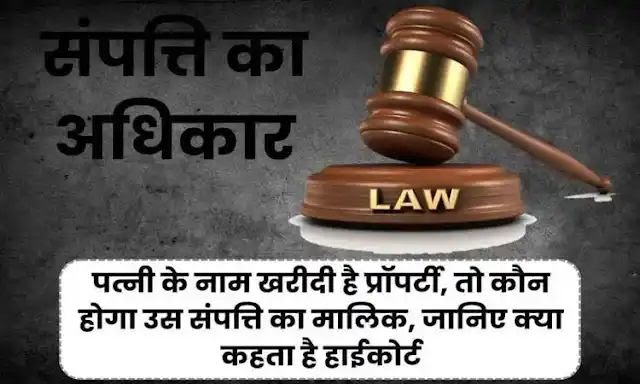Wife does not have an independent source of income (wife does not independent source of income)
The Allahabad High Court has given this important decision in this matter related to the property dispute. The court has said that the property purchased in the name of the housewife will be considered family property, as the wife does not have any independent income source. Keeping these circumstances in mind, the court said that in Hinduism, husbands often buy property in the name of their wife.
Historical verdict of Allahabad High Court
The Allahabad High Court, in an important judgment, heard a petition filed on the claim of co-ownership in Late Father’s Property in the property of the late father. During this hearing, the court said that according to Section 114 of the Indian Evidence Act of the Indian Evidence Act, the property purchased by the husband in the name of his wife can be considered as a family property.
This is because the husband usually buys property in the name of his wife keeping in mind the family interests, and the wife usually does not have any independent source of income of income.
It is very important to certify the source of wife’s income freely
The High Court in its judgment also clarified that until it is proved that the property purchased has been purchased from the wife’s income, it would be considered to be purchased from the husband’s income. The case was filed on behalf of the appellant Saurabh Gupta, in which he demanded that he be given the status of a quarter of the property purchased by his father. He argued that this property was purchased by his late father, and he is a co -stakeholder with his mother.
Saurabh Gupta filed an appeal in the High Court against the decision of the lower court. The High Court considered Saurabh’s mother a defendant in this case. Saurabh had submitted a petition demanding a ban on transfer of the property to a third person. In this case, Saurabh’s mother also gave a written statement, stating that her husband gave her as a gift, because she had no source of income.
The lower court had rejected the petition seeking an interim stay in the case, after which Saurabh filed an appeal in the High Court. Hearing Saurabh’s appeal, the High Court said that the property purchased by the husband in the name of the wife will be considered purchased from the personal income of the husband, as the wife usually has no means of earning. Therefore, this type of property will be considered as the property of the joint Hindu family. In these circumstances it is necessary that the said property be prevented from handing or selling to a third party.
Wife does not have the right over the property while living with husband
According to Indian law, as long as the husband is alive, the wife has no right over the property acquired. The wife only gets the rights after the husband’s death. Under the Hindu Succession Act of 1956, the wife gets an equal share of the son in the ancestral property. But this right applies only to ancestral properties, not those assets that the husband herself has acquired.
If the husband dies and the wife is the only heir and is not a child, he will get one-fourth of his property; If there are children, he will receive one-eightth part. If the husband has created a will, then the rights of property will be decided on the basis of that. If there is no wife’s name in the will, then she will not get anything from her husband’s own property. An important question is that if the property is purchased in the name of the wife, then who will have the right to him. In this regard, the High Court has given clear guidelines in its decision.
